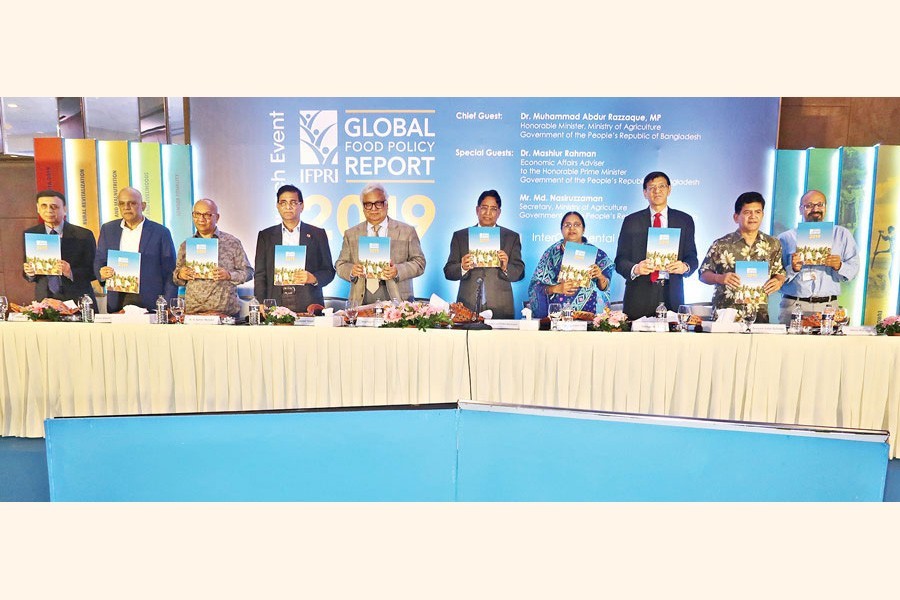Poverty, limited rural jobs crimp SDG attainment
IFPRI report pinpoints some areas that need improvement

Published :
Updated :

A deepening cycle of hunger and malnutrition, persistent poverty, limited economic opportunities and environmental degradation in rural areas are retarding progress in sustainable development goals (SDGs).
According to a global food policy report, these rural crises also threaten global climate targets, and improved food and nutrition security.
It also pinpointed some areas in need of improvement.
Bangladesh has low access to basic sanitation in rural areas, hovering just above 40 per cent.
Limited access to sanitation in rural areas signifies why child stunting here still remains too high.
Progress in these and other areas of development remain critical to improve rural livelihoods, according to the Global Food Policy Report (GFPR) 2019.
International Food Policy Research Institute (IFPRI) launched the report at a city hotel on Thursday.
IFPRI Bangladesh organised the event where agriculture minister Muhammad Abdur Razzaque was present as the chief guest and PM's economic affairs adviser Mashiur Rahman as the special guest.
IFPRI director general Shenggen Fan presented the report that highlighted Bangladesh as one of the South Asian leaders in improving rural development indicators and food and nutrition security.
But it spotlighted the need to close the persistent rural-urban development gap by continuing to design and implement innovative development programmes that address rural needs.
As in many developing countries, rural Bangladesh remains underserved and faces multiple challenges like severe environmental degradation, agrarian crises and acute youth unemployment.
To this end, the report calls for rural revitalisation through highlighting policies, institutions and investments that can make rural areas vibrant and healthy to live, work and raise families.
Rural populations account for 45.3 per cent of the world's total population, with 70 per cent of them being extreme poor.
The global poverty rate in rural areas is currently 17 per cent, more than double the urban poverty rate of 7.0 per cent, the report stated.
Mr Fan laid emphasis on revitalisation that could make rural areas premier hubs of innovations in a decade.
"Rural revitalisation is timely, achievable and critical to ending hunger and malnutrition in just over a decade," he said.
To this end, Mr Fan focused on five building blocks-farm and non-farm rural employment opportunities, gender equality, environmental upgradation, access to energy and investment in good governance.
The IFPRI report cited evidence that improving rural roads helped Bangladesh reduce extreme poverty by 3.0 to 6.0 per cent and boosted secondary school enrolment.
Programmes that increased the availability of health workers and supported women's political, social and economic empowerment were also highlighted as the key to its success.
During a panel discussion, Power and Participation Research Centre (PPRC) executive chairman Hossain Zillur Rahman emphasised sustainable land management more creatively.
He called for pursuing the goal of enhancing agricultural productivity keeping in mind the issue of environmental sustainability.
Mr Rahman, also a former caretaker government adviser, aired concern on the mass exodus of youths from agriculture as they are not interested in staying in rural areas.
He also highlighted the need for investment in quality schooling in rural areas, creating new source of employment in agriculture and high productivity employment in non-farm sector.
Former vice-chancellor of Bangladesh Agriculture University (BAU) MA Sattar Mandal said rural mechanisation is not just agricultural mechanisation.
It has been the key to rural revitalisation, he added.
Mr Mandal cited 1.4 million shallow tubewells, 35,000 deep tubewells, 0.7 million power tillers and tractors, 15,000 reapers, 0.5 million combined harvesters now operated by the private sector.
All these have resulted in scarcity of farm labour and increase in real wage, he added.
IFPRI Bangladesh country representative Akhter Ahmed suggested promotion of agriculture-driven, non-farm activities like vocational training in repairs and servicing of machinery by rural youth.
They could also be employed in agricultural value chains like packaging and transport, he observed.
In Bangladesh, Mr Ahmed said, the capacity to absorb the growing rural labour force in agriculture is very limited, resulting in low employment response of increased output.
Therefore, a shift of rural labour force out of agriculture, accompanied by faster agricultural growth, is the key to boosting rural incomes, he added.


 For all latest news, follow The Financial Express Google News channel.
For all latest news, follow The Financial Express Google News channel.